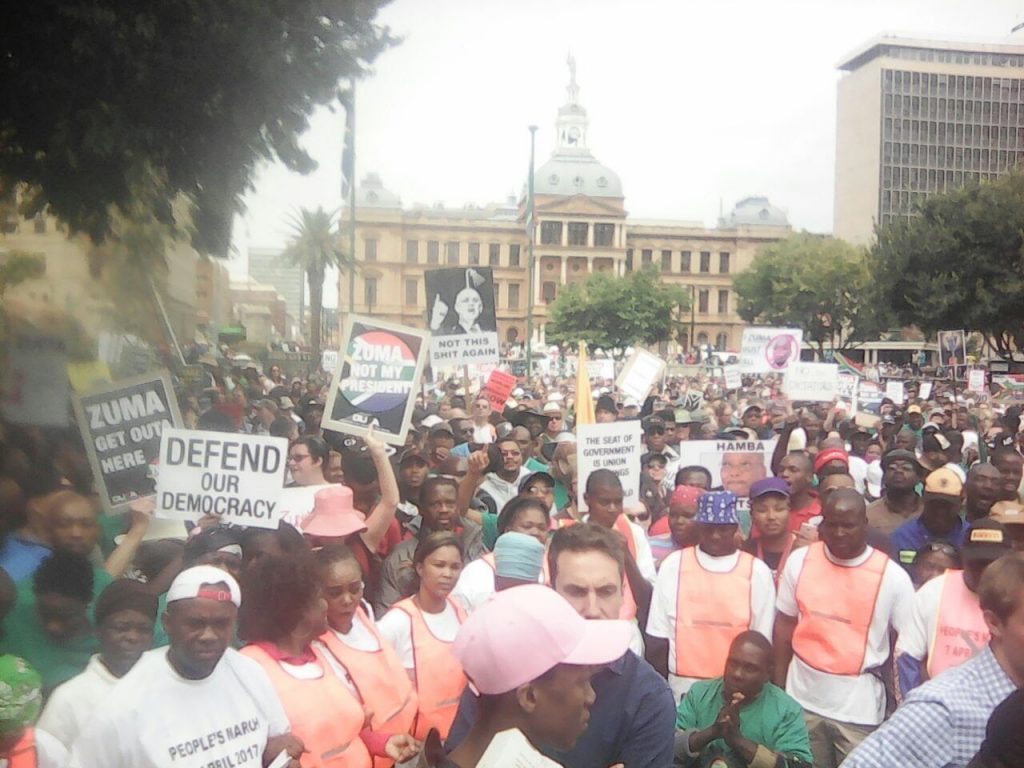By Dorothy Mabelebele, Searatoa Van Driel and Mzwandile Maila
On the 7th of April 2017, tens of thousands of South Africans across the country gathered in different cities and townships in support of “Shut down SA” a national day of action planned for the following week. About 40 000 people nationwide marched to different places in Johannesburg, Pretoria and Cape Town. Residents were out in protest of the President Jacob Zuma’s corruption and reshuffling of cabinet, demanding that he step down. Karibu! covered protests both in Johannesburg and Pretoria.
In Johannesburg, the Democratic Alliance (DA) supporters held a march from Westgate to Mary Fitzgerald Square in Newtown. DA leader Mmusi Maimane said in his speech to the crowd that “this march is for all South Africans… [it is] not a political strategy.” Addressing protestors, Maimane spoke about South Africa as a “country in crisis”. Maimane referred to the corrupt relationship between Zuma and the Guptas as a “political monopoly that holds [South Africa] back”.
In describing the composition of people who had come out to support of the anti-Zuma protests, Maimane evoked the 1994 spirit of the ‘rainbow nation’, speaking of “Thousands of businesses… showing their support by shutting their doors for the day, workers and employers joining hands, political opponents united in a common goal, religious leaders…, rich, poor, black and white.” Maimane said that “in 1994, South Africans from all walks of life” – including “political leaders, business leaders, religious groupings, and civil society organisations” – came together to build a new “united, democratic and non-racial future” for South Africa.
Maimane encouraged citizens to support the Anti-Zuma campaign and join “a new movement for change… that transcends the barriers that divide us”, and that “those in the ANC who still have a conscience, … with the help of business, churches, trade unions and civil society”, must unite to “take [South Africa] back”.
 Meanwhile, just a few blocks away, hundreds of ANC supporters were gathered at Beyers Naude Square in support of their president. Hundreds of Umkhonto we Sizwe (MK) veterans stood guard outside Luthuli House. ANCYL President Collen Maine said they “welcome the junk status” that is affecting South Africa, and that the ANCYL stand by their president. ANC members became increasingly violent towards people deemed to be political opponents as the day of protests went on. Three DA supporters were attacked and Bishop Adams of ANC Gauteng had to intervene and rescue the attacked people.
Meanwhile, just a few blocks away, hundreds of ANC supporters were gathered at Beyers Naude Square in support of their president. Hundreds of Umkhonto we Sizwe (MK) veterans stood guard outside Luthuli House. ANCYL President Collen Maine said they “welcome the junk status” that is affecting South Africa, and that the ANCYL stand by their president. ANC members became increasingly violent towards people deemed to be political opponents as the day of protests went on. Three DA supporters were attacked and Bishop Adams of ANC Gauteng had to intervene and rescue the attacked people.
In Pretoria, SAVE South Africa held a peaceful march, supported by church organisations like South African Council of Churches (SACC); civil society organisations like Right2Know Campaign (R2K), Treatment Action Campaign (TAC), trade union federations like Federation of Unions of South Africa (Fedusa), South African Federation of Trade Unions (SAFTU), and many political parties such as Freedom Front Plus, and Congress of the People (COPE), with a some EFF supporters as well.
The march started at Church Square (Pretoria) and proceeded to the Union Buildings. Marchers carried banners and placards written; “HAMBA TSOTSI”, “ZUMA MUST GO!” and the “People united will never be defeated.”
The following week, Anti-Zuma protests continued with a National Shut Down planned for and going ahead on Wednesday, 12 April. More than 80 000 people across the country participated in the protests, with two main marches taking place in Pretoria (to the Union Buildings), and Cape Town (to Parliament).
Economic Freedom Fighter (EFF) Leader Julius Malema said at the demonstration that Jacob Zuma must step down as President of South Africa because his “careless Cabinet reshuffle of four Finance Ministers in three years has plunged the country into ‘junk status’.” Malema said South Africa’s downgraded credit rating will lead to high interest rates levied on home, cars and student loans, high food prices and a bigger fiscal debt.
Leader of United Democratic Movement (UDM) Bantu Holomisa said that Zuma’s days are numbered because the people of South Africa are tired of him and his actions. “South Africans are concerned that [the ruling party is] allowing this land of ours to decline under its watch”, said Holomisa. “Our people are most concerned about corruption, poverty, unemployment and lawlessness… Bank won’t lend us money and the government will struggle to service our debts. [This will create] the knock-on effect of our country’s economic “junck status” [and] will negatively impact our people.”
Holomisa also suggested that all in support of the Anti-Zuma camapign must start to come together to decide on a way forward. “We cannot continue marching forever,” he said. “We must find a way to converge under one roof to discuss South Africa’s future.”
More demonstrations, protests and marches are planned in the next few weeks throughout South Africa, as opposition parties attempt to bring a motion of no confidence to Parliament.


